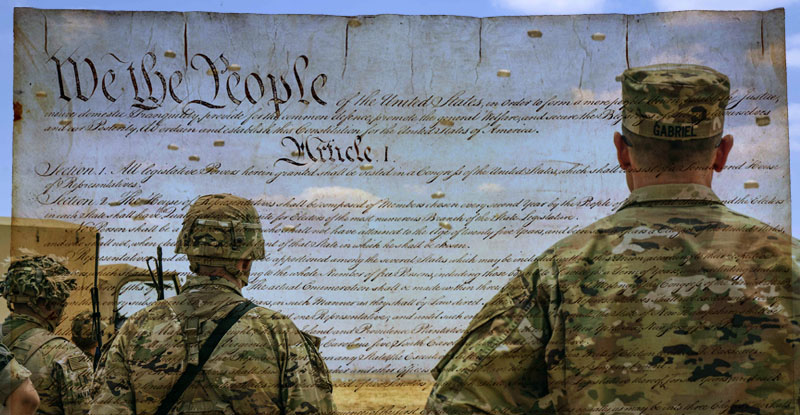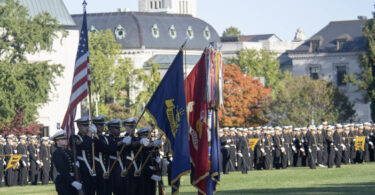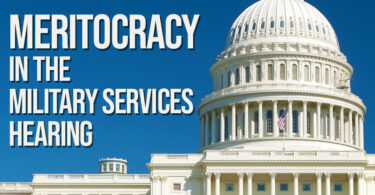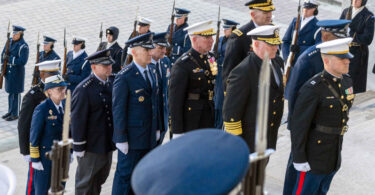By John Cauthen, USNA ’02, former Naval officer
Every commissioned officer and enlisted member of the armed forces swears an oath of office or enlistment — not to an organization, political party, branch of service, or person, but to the U.S. Constitution.
Swearing fealty to “support and defend” a document may be novel , and while many members mechanically recite the oath, how many understand why it’s required?
Fifteen years ago, as a uniformed instructor in the U.S. Naval Academy’s History Department, I taught American naval history to plebes (freshmen), many of whom had just taken the oath of office. As an experiment, I often asked students when our nation’s Constitution was ratified and became the law of the land. The majority of students answered 1776.
That most students answered incorrectly was more than a curiosity. It was clear those charged with supporting and defending the Constitution, potentially at the cost of their lives, did not possess a firm grounding in our nation’s history, the structural basics of government, and the solemnity of the oath.
This ignorance, unfortunately, does not appear limited to time and place but may be more pervasive, among both officers and enlisted.
For example, rather than reinforcing the foundations of and focusing on professional military education and training, civilian and military leaders instead seem more intent on designing and implementing a military-wide diversity, equity, and inclusion apparatus that is often at odds with our Constitution, notably the 14th Amendment’s equal protection clause, and various federal statutes, including the landmark Civil Rights Act of 1964.
DEI, to use the Left’s Orwellian doublespeak, seeks to supplant the ideas of equal opportunity and color blindness with equal outcomes based on superficial racial and other identity traits.
And it is being used in the military to subvert merit-based programs and promotions.
DEI, an inherently political project, will create division within the ranks, exacerbate tensions between uniformed and civilian leaders, and fundamentally imperil military professionalism and the balancing forces so critical to civil-military relations.
Interestingly, public law does not mandate the creation of a DEI apparatus, although President Joe Biden’s recent executive order seemingly does.
The 2021 National Defense Authorization Act created a Department of Defense chief diversity officer position and military department diversity advisers. Noticeably absent is any mention of equity or the requirement to create DEI programs and offices.
Yet civilian and military leaders have embraced DEI.
Why does our nation’s leadership obsess about DEI and insist on its integration across the military when personnel arguably lack the rudiments of professional military education conducive to understanding their oaths and the importance of healthy civil-military relations?
Simply put: liberal political power.
The military is perhaps the remaining American institution insulated from a full leftist takeover. Remaking the military will complete the Left’s agenda of co-opting America’s elite institutions, which include academia, media, business, and the government.
As emeritus professor Mark Bauerlein recently opined, “Marx himself would call DEI a classic case of ideology, a set of benign-seeming ideas that disguise the workings of the rulers, in this case empowered progressives.”
For insight into a future “woke” military, one only need to read a 2020 manifesto drafted by U.S. Military Academy graduates addressed to West Point leadership.
Among other assertions, the authors alleged systemic and endemic racism, called for racially segregated affinity spaces, and advocated political activism. Most people would likely agree the vision laid out by these nine army officers is not the military our nation wants or needs to confront 21st century threats.
Thankfully, not all military service members are willing to bend to the Left’s demands.
A group of cadets at the U.S. Air Force Academy, with faculty support, recently created a club called the Academy Oath Project to address professional military education deficiencies that fail to imbue cadets with a comprehensive understanding of constitutional norms, our republican form of government, and the fundamentals of civil-military relations.
As the cadet founders and faculty advisers for the Oath Project noted, an oath of office-centered curriculum reinforces a “professional ethos that would keep service members focused on the norms of behavior in a military accountable to elected civilian leaders” and “the importance of upholding the values inherent in an apolitical military.”
To maintain a military devoid of politics and focused on deterring and winning future conflicts against increasingly hostile foes, civilian and military leaders need to revert to the fundamentals of professional military education, eliminate all aspects of DEI and its attendant “woke” ideology, and reinforce that one’s highest duty is to the Constitution.
John Cauthen, a retired naval officer, graduated from the U.S. Naval Academy in 2002 and taught in the academy’s history department from 2007 to 2010.








Leave a Comment